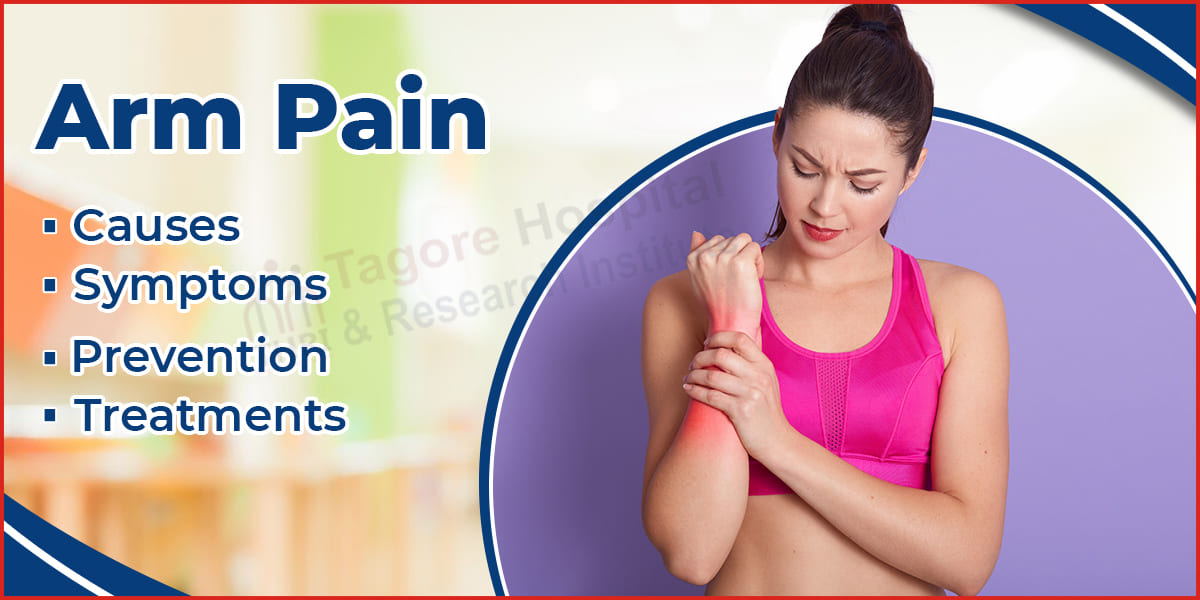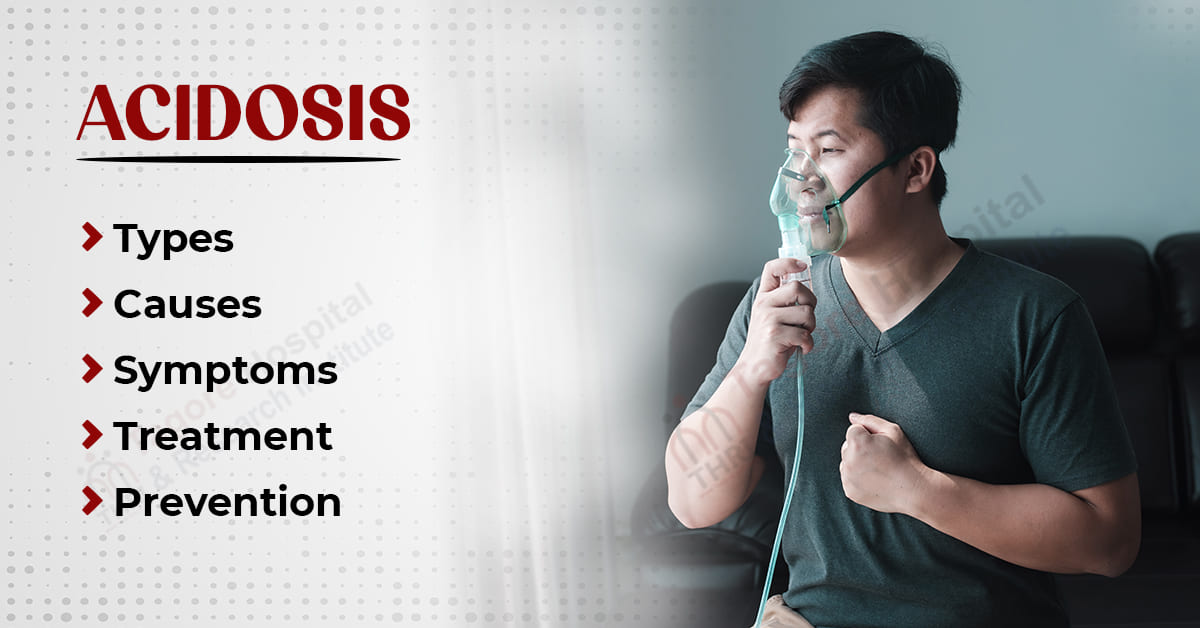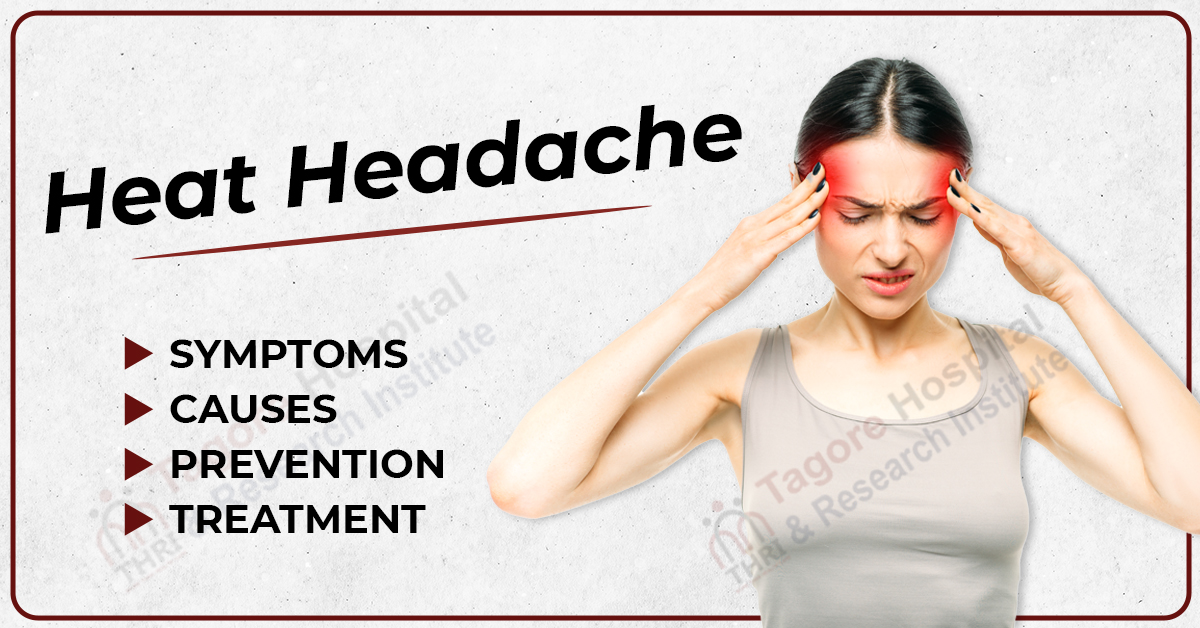- By Tagore Hospital
- Posted September 25, 2025
Pain in the arm is a very common complaint. It can range from minor agony to real disability. Anybody can have it, even children; hence, it can be as straightforward as muscle strain or something more ominous.
When you suffer from arm pain that is persisting or sharp, knowing the symptoms, causes, and best treatment might help in managing the condition. All about arm pain, from its causes to preventions and treatment, will be discussed here.
What Is Arm Pain?
Pain in the arm is any unpleasant sensation, aching, or sharp feelings occurring in the arm, shoulder, upper arm, forearm, and hand. It can be caused by a plethora of conditions ranging from trauma and overuse to more serious things like nerve compressions or cardiovascular problems. The pain will be constant, intermittent, or radiating in other areas like in the neck or chest.
Another way of saying this is that arm pain results from something going astray in the muscles, tendons, ligaments, joints, or nerves of the arm. Keeping tabs on your symptoms is really important since, in some cases, arm pain may well be a symptom of a grave underlying ailment.
Symptoms of Arm Pain
Depending on its etiology, arm pain can manifest in various ways. The common symptoms for arm pain consist of:
- Pain or Discomfort: Ranging from mild aching to sharp, shooting pain, it could be a constant irritation or an intermittent one, with the pain intensity increasing with any form of movement of the limb or physical exertion.
- Swelling: The inflammation could be around the shoulder, elbow, or the wrist, and would cause some swelling accompanied by tenderness and warmth.
- Numbness or Tingling: Where nerve involvement does exist, you could, depending on the limb or the fingers, experience sensations of pins and needles, numbness, or the 'fainting' feeling.
- Stiffness: Due to pain, or inflammation, the shoulder, the elbow, or the wrist will have a limited range of motion and thus restrict free functioning of the arm.
- Weakness: Some conditions may cause muscle weakness and there may be difficulty in gripping objects and lifting items.
You can read also:- Typhoid Diet: Foods to Eat, What to Avoid & a Recovery Plan
What Are the Most Common Causes of Arm Pain?
The knowledge of the exact causes of arm pains should help you in being able to really resolve the issue. Some of the common causes are:
1. Muscle Strain and Overuse
Working too hard or performing repetitive motions-lifting heavy things, impeding sports injuries, or sitting hours on end at the office-can strain the muscles found in the arm. Strain places increased tension on muscle fibers, leading to tears and stretching to the point where they really cannot return to their usual capacity, which is associated with pain, swelling, or the formation of stiffness.
2. Tendinitis
Tendon gliding inflammation usually develops from overuse or repetitive actions. The most usual types of tendinitis comprise rotator cuff tendinitis, in which tendons around the shoulder joint become painful and less mobile.
3. Nerve Compression (Carpal Tunnel Syndrome)
Neck, shoulder, or wrist nerve pressures can cause some radiating pain down the arm. For example, carpal tunnel syndrome is a very good case showing nerve compressions causing arm pains: it occurs when the median nerve of the wrist gets compressed.
4. Fractures and Bone Injuries
An arm injury from trauma, such as those caused by a fall or an accident, might lead to fractures or breaks of bones of the arm. Pain due to fracture is severe, accompanied by swelling, bruising, and inability to move the arm.
5. Arthritis
For the elbow, shoulder, or wrist, bone and joint pains of arthritis could be a reason. Inflamed joints tend to hurt, grow stiff, and limit movements. In rheumatoid arthritis, the immune system incorrectly targets the joints, resulting in chronic inflammation.
6. Pain That May Resemble a Heart Attack
Infrequently observed but is frequently serious, left arm pain may sometimes be related to a heart attack. Whenever this occurs, the pain is unlike typical musculoskeletal pain usually centered in the chest, and may radiate into the arm and be accompanied by symptoms such as tightness in the chest, or problems with breathing, or feeling dizzy.
Ways to Prevent Arm Pain
Arm pain can be prevented through some proactive steps. Some of the best practices to avoid arm pain should include:
1. Postural Adaptations
Maintaining good posture while sitting, standing, or even sleeping to avoid muscle strains or nerve pathway strains in the arm as a result of slumping or bending the back into an unusual position. Do this in standing or sitting or bending or leaning in your work space.
2. Strengthening Exercises
Stay active in a regular basis to strengthen the muscles of the arms, shoulders, and upper back. Coupled with functional movement patterns like lifting an object in your arms, this will help your muscles appropriately support your joint and lead to less injury.
3. Stretching and Warm-Up Exercises
Remember to stretch and warm-up your muscles, especially before starting any physical activity for better range of motion. This will also help avoid muscle strain and ligament injuries.
4. Taking Breaks
If in any repetitive activities, maybe typing, lifting, or working on the computer, take breaks. This will help prevent overuse injuries such as tendinitis and carpal tunnel syndrome.
5. Proper Techniques
Use proper lifting techniques while lifting heavy objects to avoid injuries or anything that puts strain on your arms. For example, bend your knees and keep your back straight when lifting weights or objects.
6. Avoid Overuse
Exercise care to avoid overuse of the muscles during any intense physical activity. Ensure that the arms undergo a period of rest between exercises to regain energy.
You can read also:- Jaundice: What It Is, Symptoms, Causes & Treatment
How Can I Relieve Arm Pain?
There are a whole lot of remedies to consider in the relief of arm pain:
1. Rest
In cases of minor injuries or muscle strains, usually, a good rest is given priority. Do not use the affected arm too much, giving other muscles and tissues a chance to heal.
2. Ice and Heat Therapy
The first 48 hours after injury may require some icing to reduce inflammation and temporarily numb to dull pain, with icing given for about 15-20 minutes. After the certain period, heat therapy can be applied to loosen tight muscles.
3. OTC Pain Relievers
Over-the-counter painkillers like ibuprofen are considered NSAIDs, which are appropriate for the treatment of pain and inflammation. You must follow medication guidelines and dosing instructions.
4. Physical Therapy
Physical therapy is likely to be valuable if your arm pain is due to muscle weakness, joint stiffness, or even poor posture, as it likely will involve exercises to help with strength, flexibility, and posture. Usually, the physical therapist will instruct patients to perform exercises.
5. Prescription Medications
If your pain and inflammation are severe enough your doctor is likely to offer you more powerful painkillers or muscle relaxants.
6. Surgery
In the event the pain is from a serious injury-certainly if you have torn a tendon or have a herniated disc-and the pain continues to persist after conservative management, surgery may be an option.
Conclusion
There are many reasons for pain in the arm-being the least in muscle strains and the most in medical conditions that require the attention of a physician. Being aware of the symptoms and causes helps one take action before the problem worsens. Whether it is something like a sports injury or repetitive use, or if it happens to be nerve compression or arthritis, proper guidance is needed.
Maintain good posture, stretch regularly and strengthen your arms to prevent arm pain. And if any pain endures, consult with your doctor as soon as possible to determine its cause and treatment.
Under the aegis of the supreme chain of hospitals that is Tagore Hospital, Jaipur, we have the expertise to diagnose and treat all musculoskeletal problems including arm pain. If you have any kind of pain in your arms, contact our expert orthopedic and pain management team for comprehensive care.
Tags





